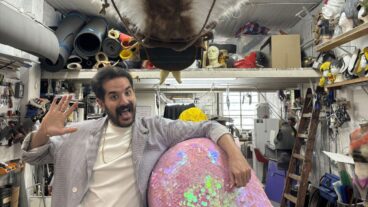Two minutes of good practice is better than playing badly for two hours – Ariel Lanyi.He may be a slow starter compared to Mozart who began composing at age five – but by releasing his first CD at nine years of age, Israeli jazz pianist Ariel Lanyi is something of a phenomenon.
The Jerusalemite youngster’s debut release, 31 Bars, features nine original Lanyi compositions with the remaining three demonstrating his own, free jazz-oriented takes on jazz standards.
Lanyi first began tickling the ivories when he was two years old and embarked on formal classical piano studies when he was four. His musical explorations, and listening pleasure, stayed within classical confines until just over a year ago. While surfing music websites he caught a 10-second sound byte of pianist Earl Hines, who made his name in Louis Armstrong’s renowned Hot Five band in the late 1920s.
“That was it for me,” Lanyi told ISRAEL21c. “I can’t say exactly why, but that drew me into jazz. I was fascinated by what I heard.”
That brief encounter with Hines whetted the then seven-year-old’s appetite and he set about voraciously learning as much as he could about the genre. “I looked for stuff about Charlie Parker, Dizzie Gillespie, Wes Montgomery, Sonny Rollins… all the greats.”
While imbibing from the founding fathers of modern jazz, Lanyi kept up his classical studies, and still listens to works by Bach, Beethoven and Schumann and more contemporary composers such as Bartok and Stravinsky. But, above all, it was the less structured side of improvisational music that really captured his imagination.
“I recently listened to an older pianist – he was 14. He’s got four or five CDs out, but I didn’t like what he was doing. It was boring. Everything he did was predictable. I like to explore and discover new things. I want to do something new, something that’s never been done before. Otherwise, there’s no point in playing at all,” he said.
Coming from a nine-year-old one could take such statements as forgivable childish bravado, but Lanyi puts his artistry where his mouth is.
His CD launch performance in Jerusalem recently was nothing short of spellbinding as he flew through the numbers on the album with breathtaking fluidity. His in-between banter was the stuff of a seasoned professional, and all in English. Lanyi seems to excel at everything he sets his hand to. Besides piano he also plays guitar, violin, drums and double bass and he speaks three languages.
The album was produced under the guidance of Lanyi’s French-born Jerusalemite bass playing teacher Jean Claude Jones who says he relates to his pint-sized disciple more as a colleague than a junior student. Jones, who contributes to a number of tracks on 31 Bars, also points out the CD is not to be a statement of intent or a showcase vehicle for Lanyi’s impressive talents.
It was really just an exercise, to see where Ariel is at the moment,” Jones told ISRAEL21c. Exercise or no, Lanyi has been wowing audiences up and down Israel for several months now, including at the recent international Globus Jazz Festival held in Jerusalem.
Despite his musical aptitude, however, Lanyi does many of the things one would expect of a fifth-grader. He attends school everyday, except Wednesdays, faithfully does his homework, plays soccer, swims at least once a week and is learning karate. Besides his native Hebrew, he speaks English with his Romanian-born father and Russian with his mother. Like most of his contemporaries he also enjoys surfing the Internet, which led to his interest in jazz. On Wednesdays, his day off from school – with the principal’s blessing – he spends several hours with Jones honing his improvisational piano playing and compositional skills.
The nine-year-old is keen to learn everything he can about jazz. He listens to CDs and goes with his dad to see every foreign jazz musician who comes to Israel to perform, even if the shows end way past his bedtime. One wonders how he manages everything – how he manages to do shows, many of which finish after midnight, and still get up for school in the morning and not doze off in the classroom. And when does he find time to practice?
“Actually, I don’t practice that much,” says Lanyi with a mixture of studied seriousness and insouciance. “Two minutes of good practice is better than playing badly for two hours.”
Lanyi is also a handy writer of music. “Sometimes Ariel wakes up in the morning with five new pieces in his head,” explains his father Gabi. “He’ll sit down at the computer and put down the basic tune, and he fills it out later.”
Gabi accompanies his son to all his concerts and the other artists’ shows. He makes sure his son keeps his feet on the ground and the elder Lanyi doesn’t appear to be the type of over-ambitious, fame-driven parent who have been the undoing of some other junior prodigies – particularly in sports.
“When he comes back from school Ariel has to do his homework first before he plays music,” says Gabi. “I don’t know what will happen when he grows up, or when he hits adolescence. We’ll just have to wait and see.”
The interplay between Lanyi and his teacher Jones can veer from the serious to the playful. In between answering the interview questions, Lanyi got up and walked over to Jones’ piano and began to spin out some comic versions of legendary jazz trumpeter Dizzy Gillespie’s popular “Night in Tunisia”. Jones didn’t mind the humorous approach but he did mind the beat Lanyi was playing.
“What about the rhythm?” Jones admonishes his diminutive student. “It’s got to swing.” Smilingly Lanyi just turned back to the piano and played another intriguing take on the Gillespie score. That got the thumbs up Jones.
While it’s still too early to tell, the New York jazz community may well have a brilliant Israeli artist to admire in a few years time.












